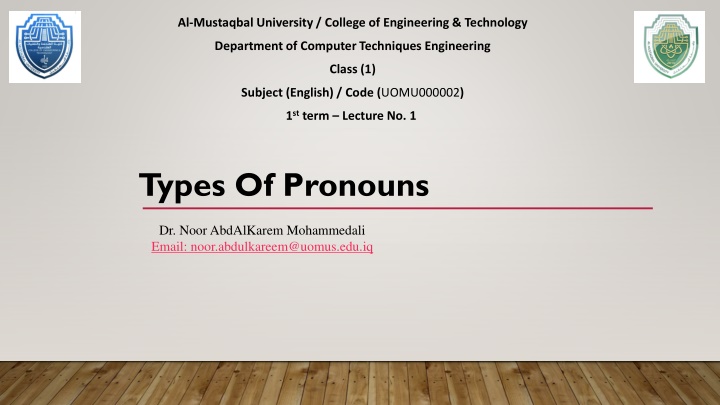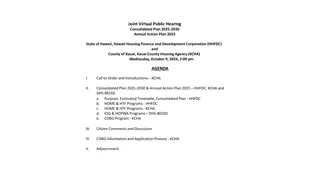
Understand Different Types of Pronouns in English Grammar
Explore the various types of pronouns in English grammar including personal pronouns, reflexive pronouns, possessive pronouns, object pronouns, and possessive adjectives. Learn how pronouns are used in sentences with examples and understand the differences between them. Enhance your knowledge of pronouns through this comprehensive guide.
Download Presentation

Please find below an Image/Link to download the presentation.
The content on the website is provided AS IS for your information and personal use only. It may not be sold, licensed, or shared on other websites without obtaining consent from the author. If you encounter any issues during the download, it is possible that the publisher has removed the file from their server.
You are allowed to download the files provided on this website for personal or commercial use, subject to the condition that they are used lawfully. All files are the property of their respective owners.
The content on the website is provided AS IS for your information and personal use only. It may not be sold, licensed, or shared on other websites without obtaining consent from the author.
E N D
Presentation Transcript
Al-Mustaqbal University / College of Engineering & Technology Department of Computer Techniques Engineering Class (1) Subject (English) / Code (UOMU000002) 1st term Lecture No. 1 Types Of Pronouns Dr. Noor AbdAlKarem Mohammedali Email: noor.abdulkareem@uomus.edu.iq
PRONOUN & TYPES OF PRONOUN What is pronoun? The word which is used in place of a noun is called pronoun. For example: he, she, it, I, we, you, they etc. There are different types of pronoun. Examples of Pronoun Stiffen is a good boy. He obeys his parents. Einstein was a famous scientist. He was very genius. What are you doing here? I am good player of hockey. Here in these sentences you can see that he, he, you, and I are used as pronouns respectively.
TYPES OF PRONOUNS There are different types of pronoun in English grammar all of these kinds of pronoun are described below Personal pronoun (I, we, he, she, it, etc.) Reflexive pronoun (Myself, ourselves, themselves etc.) Possessive Pronoun (Yours, mine, hers, theirs etc.) Object pronouns (me, him ,her ,us, etc.) Possessive adjective (my ,your ,his, her, its, our, your, their)
SUBJECT PRONOUNS A personal pronoun is used for the name of a person or a thing. For example, I, we, you, they, he, she, it,etc. The subject pronouns are: First person (I, we, ) Second Person (you, you) Third Person (he, she, it, they) Examples He is my friend. It is a black cat. They are animals.
REFLEXIVE PRONOUNS When the action done by the subject reflects upon the subject, it is called reflexive pronoun. For example: myself, yourself, himself, herself, itself, ourselves etc. Note. Reflexive pronouns are made by adding self to the end of the personal pronoun. Examples They enjoyed themselves. I will do it myself. You will hurt yourself.
OBJECT PRONOUNS We use an object pronoun after verb ,preposition, and at the middle or end of sentences. For example: me, him, her, us, It, you, them. Help me please. He plays with her. We saw them. Or They saw us. Do you live near them. After to or for with verbs like make, give, send, lend, pass, take, show. The little boy made it for her.
POSSESSIVE ADJECTIVE There is a different between possessive pronoun and possessive adjective. We use possessive adjective before noun but possessive pronoun at the end of sentences. For example: My book is new. His computer is old. Its cat is nice. Our house is big. Your dog is small.
POSSESSIVE PRONOUNS We use it at the end of sentences. For example: The new book is mine. The new cat is his. The new address is hers. The new house is ours. The new computer is theirs.
Al-Mustaqbal University / College of Engineering & Technology Department of Computer Techniques Engineering Class (1) Subject (English) / Code (UOMU000002) 1st term Lecture No. 2 NOUNS Dr. Noor AbdAlKarem Mohammedali Email: noor.abdulkareem@uomus.edu.iq
WHAT IS A NOUN? A noun is a person, place, thing or idea In the following sentence, what are the nouns? Most children like ice cream.
EXAMPLES OF NOUNS Cat Mall Atlanta Oxford Middle School Bag Ahmed
TYPES OF NOUNS Proper Nouns Common Nouns Plural Nouns Possessive Nouns Concrete Nouns Abstract Nouns Collective Nouns
PROPER NOUNS A proper noun is a specific person, place or thing A proper noun usually begins with a Capital Letter Examples are days of the week, holidays, religions, months, organizations, institutions and names Oxford Middle School is a proper noun, Monday, May
COMMON NOUNS A common noun refers to a person, place or thing in a general sense Common nouns only begin with a capital letter when they are at the beginning of a sentence Examples include: house, car, sidewalk, dog, school, work, book, newspaper, beach, towel
PLURAL NOUNS Plural nouns indicate more than one person or thing Plural nouns end in s or es Examples include: boxes (plural for box), hats (plural for hat), pencils (plural for pencil)
POSSESSIVE NOUNS A possessive noun is a noun that changes its form to show it owns something else Singular possessive add s Plural possessive & ends in an s add Plural possessive & doesn t end in an s s Examples: Sophie s, teacher s, cats
CONCRETE NOUNS A concrete noun is any object or person that can be experienced through your senses: sight, sound, taste, touch, smell Example: teacher, dog, beach, wave, book
ABSTRACT NOUNS An abstract noun cannot be experienced through the senses Examples: thought, memory, childhood, daydream, justice, peace
COLLECTIVE NOUNS Names a group of people or things. Can be singular or plural Singular when all members of the group act as a single unit ex. The team shares the field with its opponent. Singular Plural when each member of the group acts separately ex. The team share their jokes with each other. Examples: team, group, committee, club, family, couple
PRACTICE! In the following sentences, identify the noun(s): Nada has pretty hair. On Monday Ali is going to the beach. Ahmed did well on the math test. English is the best class!
Al-Mustaqbal University / College of Engineering & Technology Department of Computer Techniques Engineering Class (1) Subject (English) / Code (UOMU000002) 1st term Lecture No. 4 & 5 Questions And Negatives Dr. Noor AbdAlKarem Mohammedali Email: noor.abdulkareem@uomus.edu.iq
YES/NO QUESTIONS Are they working hard? Yes, They are working hard. Will they be working hard? Yes, They will be working hard. Had they worked hard? Yes, They had worked hard. Have they been working hard? Yes, They have been working hard. Mightthey have been working hard? Yes, They might have been working hard.
NEGATIVES They are not/aren't working hard. They will not be working hard. They had not worked hard. They have not been working hard. They might not have been working hard.
PRESENT SIMPLE AND PAST SIMPLE QUESTIONS AND NEGATIVES Do they work hard? They work hard. They do not (don't) work hard. Does he work hard? He works hard. He does not (doesn't) work hard. Did they work hard? They worked hard. They did not (didn't) work hard.
QUESTIONS WITH WHEN, WHERE, WHY Where are they working? They are working in a shop. Why have they been working hard? They have been working hard for their exams. When did they arrive? They arrived at Four am.
QUESTIONS WITH WHO,WHAT, WHICH Who is he seeing tomorrow? He is seeing Ahmed tomorrow. What do you want for your birthday? I want a computer for my birthday. Which would you prefer, tea or coffee? I'd prefer some tea.
QUESTIONS WITH VERBS AND PREPOSITIONS Who did you give the money to? I gave the money to my brother. Where does she come from? She comes from Madrid. How long were they waiting for? They were waiting for an hour.
Al-Mustaqbal University Computer Techniques Engineering Department College of Engineering and Technology POSSESSIVE ADJECTIVES, POSSESSIVE S, COMMON VERBS (1): HAS/HAVE, LOVE, LIKE, WORK. Dr. Noor AbdAlKarem Mohammedali Email: noor.abdulkareem@uomus.edu.iq















